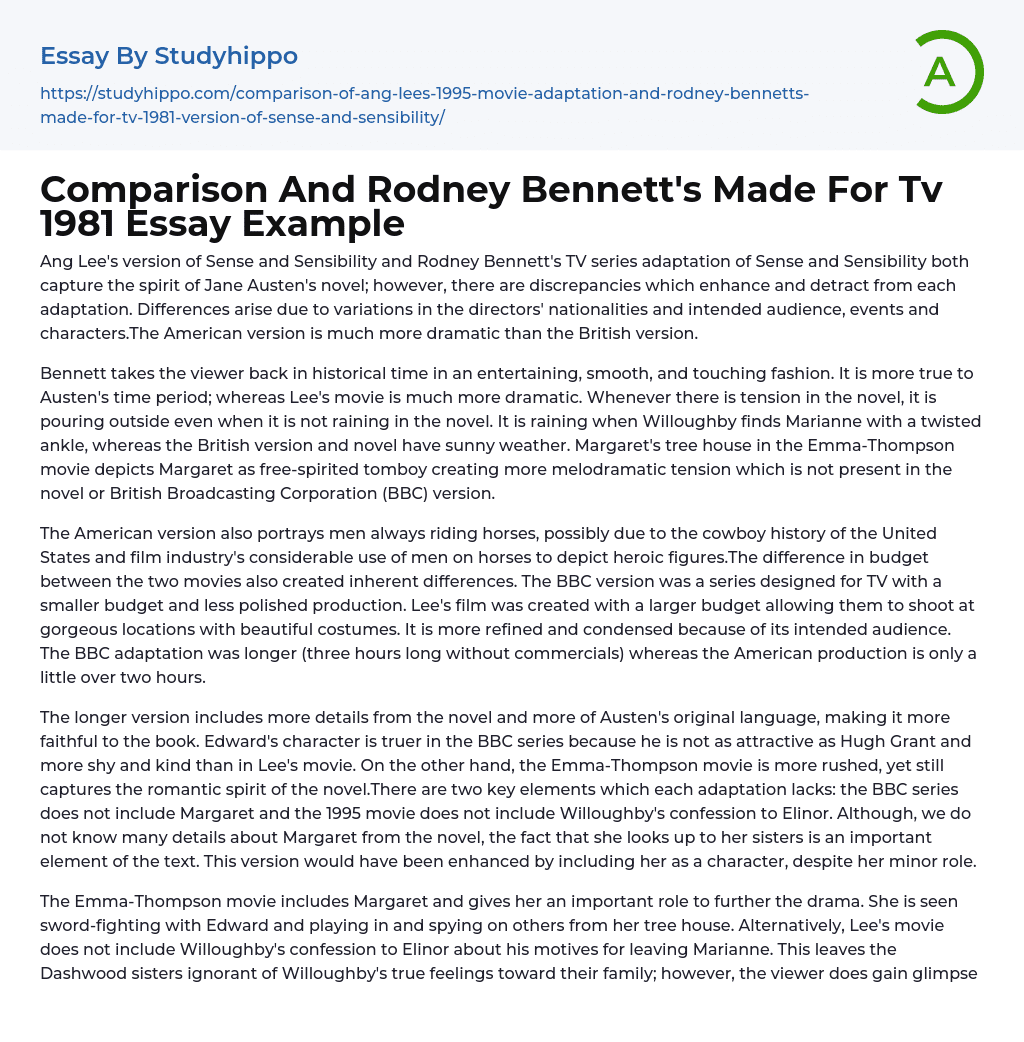

Comparison And Rodney Bennett’s Made For Tv 1981 Essay Example
Although both Ang Lee's film adaptation of Sense and Sensibility and Rodney Bennett's TV series adaptation capture the essence of Jane Austen's novel, there are variations in their portrayal which add and detract from each version. Discrepancies occur due to differences in the directors' nationalities, target audience, characters, and events. Consequently, the US adaptation is more intense compared to the British version.
Bennett's portrayal of historical time is both entertaining and touching, staying true to Austen's era. In contrast, Lee's movie emphasizes drama. The novel's tension is underscored by pouring rain, even when it is sunny in the British version. Willoughby finds Marianne with a twisted ankle in the rain, while the BBC version has sunny weather. The Emma-Thompson movie features Margaret in a tree house, adding melodramatic tension absent in the novel or BBC version.
...Both the American version and BBC adaptation of a certain movie have their distinct differences. The American version depicts men always riding horses, which may be attributed to the cowboy history in the United States and the frequent use of horse-riding men in hero portrayals in movies. Furthermore, due to the budget difference, Lee's film has stunning locations and refined costumes. It was intended for a smaller audience, hence it is more refined and condensed. Conversely, the BBC adaptation is longer, spanning three hours sans commercials, and was designed for television with a smaller budget resulting in a less polished production.
Both the longer version and the Emma-Thompson movie adaptation of Jane Austen's novel stay true to her original language and include more details from the book. However, the BBC series presents Edward's character more accurately as shy an
kind, rather than as attractive as Hugh Grant in Lee's movie. While the Emma-Thompson movie captures the romantic essence of the novel, it is more rushed. Both adaptations lack two important elements: Margaret is excluded from the BBC series, and Willoughby's confession to Elinor is not included in the 1995 movie. Despite not knowing much about Margaret in the novel, her admiration for her sisters is an essential aspect of the story that should have been included despite her minor role.
In Emma Thompson's movie, Margaret plays a significant role in the drama by engaging in sword-fighting with Edward and observing others from her tree house. Meanwhile, Lee's adaptation omits Willoughby's admission to Elinor regarding his departure from Marianne and his true feelings toward the Dashwood family. Nevertheless, viewers catch a glimpse of Willoughby towards the conclusion of the movie.
On Marianne's wedding day, Willoughby is spotted atop a hill overlooking the town, riding on a horse with a sad demeanor. He remorsefully realizes that by marrying Miss Grey for wealth, he gave up his chance at love. Although viewers possess more knowledge about Willoughby than the Dashwood family does, the scene still encapsulates its essence. Additionally, the starting and concluding segments of every movie also differ from one another.
Both the BBC series and Lee's movie feature scenes related to Mr. Dashwood's death and John Dashwood's obligation to care for his step-sisters. In the BBC series, this is implied through a conversation between John Dashwood and Fanny, whereas Lee's movie explicitly shows John promising to look after the family upon Mr. Dashwood's death.
Both versions of the novel depict the theme of illness, but the scene in one
offers more dramatic emphasis on pain while the other has an abrupt ending. The British version's sudden conclusion echoes the novel's quick romantic changes resulting in surprising marriages, such as Lucy and Robert and Marianne and Colonel Brandon. Meanwhile, the American version exaggerates emotions and highlights several important themes, including marriage, money, and love. Ultimately, neither version is superior to the other.
The two adaptations of Sense and Sensibility present variations in the portrayal of Marianne and Colonel Brandon's marriage. While the BBC version allows for a more faithful representation of the text due to its extended length, the American film offers a modern and energetic interpretation of the novel. Ultimately, the conclusion of Brandon throwing money from the carriage provides a more satisfying ending than Bennett's version.
- Boo Radley essays
- Genesis essays
- Richard iii essays
- Alice in Wonderland essays
- On the road essays
- Ozymandias essays
- The Nightingale essays
- Holden Caulfield essays
- Animal Farm essays
- 1984 essays
- A Hanging essays
- Shooting An Elephant essays
- A Tale Of Two Cities essays
- Adventures Of Huckleberry Finn essays
- Arthur Conan Doyle essays
- Brave New World essays
- Characters In Hamlet essays
- Characters In Romeo And Juliet essays
- Desdemona essays
- Diary Of A Wimpy Kid essays
- First-Person Narrative essays
- Frankenstein essays
- Heart Of Darkness essays
- Jane Eyre essays
- Jay Gatsby essays
- King Duncan essays
- Librarian essays
- Little Red Riding Hood essays
- Lord Of The Flies essays
- Silas Marner essays
- The Cask Of Amontillado essays
- The Catcher In The Rye essays
- The Crucible essays
- The Handmaid's Tale essays
- The Reader essays
- Virgil essays
- Wuthering Heights essays
- Candide essays
- Castle essays
- J. D. Salinger essays
- Ulysses essays
- Ethan Frome essays
- In Cold Blood essays
- Outliers essays
- Tuesdays With Morrie essays
- The Art of War essays
- Wife of Bath essays
- Huckleberry Finn essays
- The Lady With The Dog essays
- Great Expectations essays



